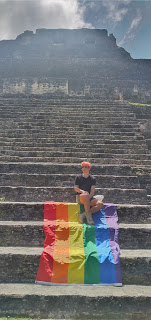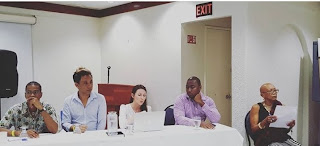Debate on TnT Gender Policy continues
Reposted May 24th, 2013
Mora: How come the IRO so powerful?By Kim Boodram
DEPUTY political leader of the
Congress of the People (COP), Dr Anna Maria Mora, said she is concerned
that religious bodies were able to dictate the formation of the National
Policy on Gender and Development.
This comes after a declaration last week by Gender Affairs Minister Marlene Coudray that the policy will not address rights for the Lesbian/Gay/Bisexual/Transgender (LGBT) community, as per the wishes of some religious groups, including the Catholic Commission for Social Justice (CCSJ) and Inter Religious Organisation (IRO).
“How come the IRO is so powerful,” Mora asked Wednesday during a lunchtime seminar under the theme, “What does equal mean to you”, held by the Institute of Gender and Development Studies of the University of the West Indies (UWI) at its St. Augustine campus on Wednesday.
Mora said she will be taking the issue to the COP. Similar expressions came out during the session, with many saying that Trinidad and Tobago had opted to deal with the issue in a way that was not modern or in keeping with the struggle for optimum human rights.
Strong objections to any references to gay rights in the policy, which is still in draft form after more than a decade of conception, were voiced up to last week by several religious groups.
At a recent consultation with Coudray, the IRO, CCSJ, Lawyers for Jesus and a number of other religious bodies said they will march against any attempts to foist on the country rights for persons who identify with LGBT.
Colin Robinson, head of the Coalition Advocating for the Inclusion of Sexual Orientation (CAISO), said Coudray has essentially told one group of people that it is “okay” to take the rights of another group.
This comes after a declaration last week by Gender Affairs Minister Marlene Coudray that the policy will not address rights for the Lesbian/Gay/Bisexual/Transgender (LGBT) community, as per the wishes of some religious groups, including the Catholic Commission for Social Justice (CCSJ) and Inter Religious Organisation (IRO).
“How come the IRO is so powerful,” Mora asked Wednesday during a lunchtime seminar under the theme, “What does equal mean to you”, held by the Institute of Gender and Development Studies of the University of the West Indies (UWI) at its St. Augustine campus on Wednesday.
Mora said she will be taking the issue to the COP. Similar expressions came out during the session, with many saying that Trinidad and Tobago had opted to deal with the issue in a way that was not modern or in keeping with the struggle for optimum human rights.
Strong objections to any references to gay rights in the policy, which is still in draft form after more than a decade of conception, were voiced up to last week by several religious groups.
At a recent consultation with Coudray, the IRO, CCSJ, Lawyers for Jesus and a number of other religious bodies said they will march against any attempts to foist on the country rights for persons who identify with LGBT.
Colin Robinson, head of the Coalition Advocating for the Inclusion of Sexual Orientation (CAISO), said Coudray has essentially told one group of people that it is “okay” to take the rights of another group.
Robinson said the rights being asked
for--the right to equal treatment; to not be harassed and bullied; the
right to feel a sense of self-worth--are human rights issues. Though enshrined in the Constitution,
the fact is that the LGBT community, much like the elderly and the
disabled, have special needs and these rights must be more explicitly
defined in any national policy. It must be clear how the minister made
her decision and how the religious bodies were able to bring this
decision to the table, he said. “Is this how we form national policy?” Robinson asked during a telephone interview.
see first story for context:www.guardian.co.tt/news/2013-05-18/coudray-gay-rights-out-proposed-gender-policy



Comments
Post a Comment